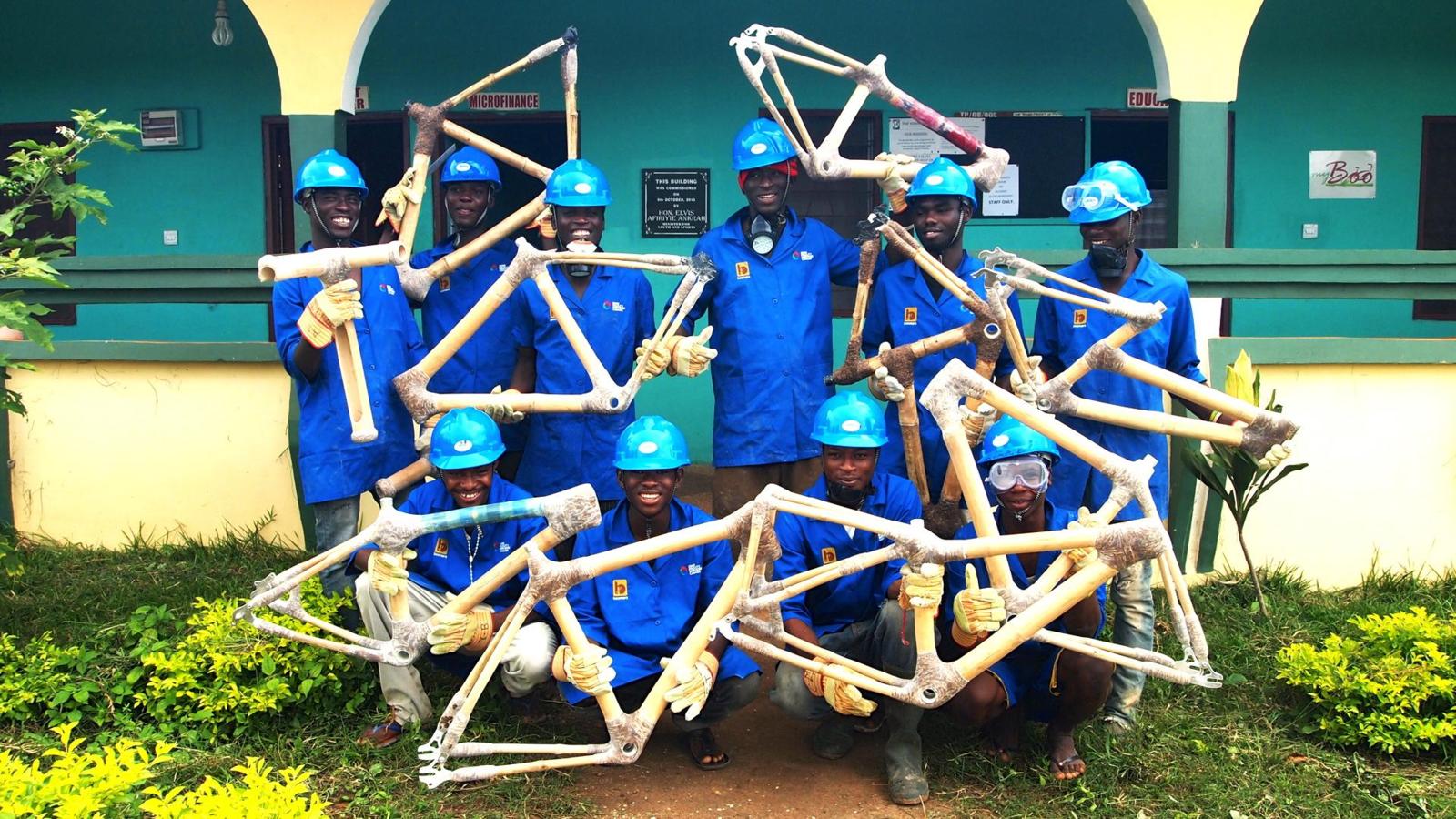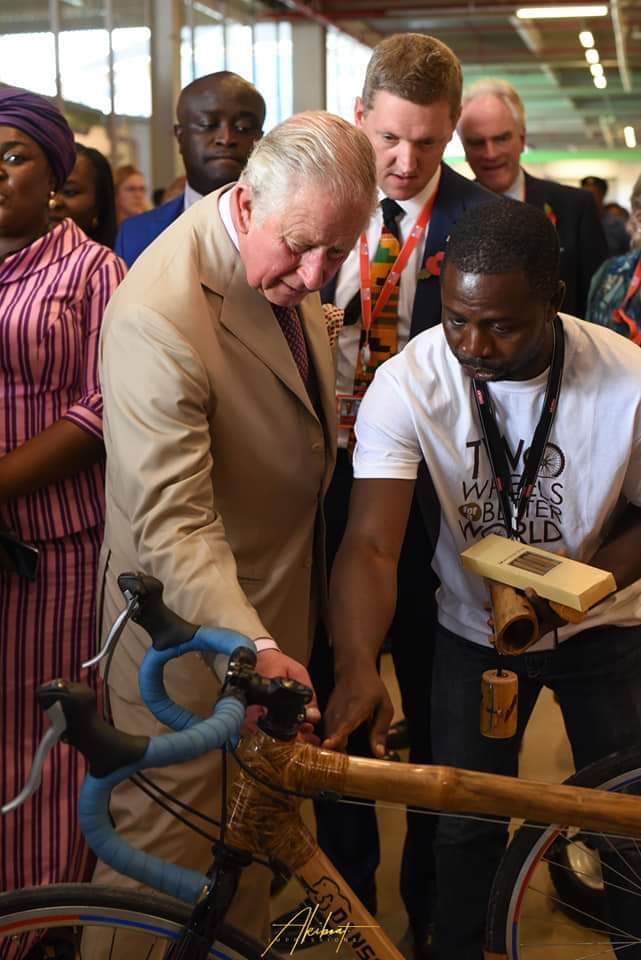In Africa, Big Plans for Bamboo Bikes - BBC Autos

The first bamboo bike was a minor sensation when the Bamboo Cycle Company introduced it in London in 1894. The bikes won praise from none other than Lord Edward Spencer-Churchill – a distant relative of Winston Churchill – who was one of a handful of aristocrats who received one as part of a publicity stunt.
But in terms of market traction, the novel, rustic-looking velocipedes never got rolling. Some might see that as a cautionary tale for promoters who see bamboo bikes (and a host of other products made from bamboo) as economic saviours in under-developed countries. But bamboo believers like Kwabena Danso remain undaunted.
“Bamboo bikes are starting to get a lot of attention on the international scene,” notes Danso, the chief executive officer of Booomers International, a two-year-old, bamboo-bike-building subsidiary of the Yonso Project, a grassroots community-development organisation in Ghana. Trend-spotting note: Last November, United Nations Secretary General Ban Ki-moon gave A-list exposure to a bike made by the Ghana Bamboo Bikes Initiative when he took it for a ride at the Warsaw Climate Change Conference. And several years ago, the Philippines presented US President Barack Obama with a bamboo bicycle made by the Manila-based Bambike Company.
Danso also points out that the United Nations Environment Programme estimates that by 2020, the sustainable-transportation market will reach $197bn. “We think bamboo bicycles will take a large percentage of this – about 40%,” he says. “They will take centre stage in the coming years.”
There is little doubt that making bike frames from bamboo makes sense. You want sustainability? Think about this: bamboo is the fastest-growing plant in the world (some species can grow 35 inches in 24 hours), so it’s a virtually inexhaustible raw material. And bamboo keeps growing after it is harvested – no replanting required.
Moreover, it takes only a couple of bamboo stalks to build a bike frame. And unlike their steel, aluminium, titanium and carbon fibre cousins, bamboo frames leave almost no carbon footprint during manufacturing. The only notable blemish on their eco-cred is a resin epoxy used to reinforce the joints.
Bamboo is also very light, yet still offers more tensile strength than steel (28,000 newtons per square inch, compared to 23,000 for steel) and dampens shocks and vibrations better, too.
Along with other groups such as the aforementioned Ghana Bamboo Bike Initiative and Bamboosero, founded by renowned bike-frame designer Craig Calfee (who taught Danso how to fabricate bamboo frames), Booomers is helping Ghana become a nascent haven for bamboo-bike building. A robust bamboo-bike cottage industry would be a boon to the country, which suffers from high unemployment, especially among people between the ages 18 and 25. And supplying even just Ghanaians – much less global markets – with affordable bikes would help mitigate transportation woes, particularly in rural areas, where simple things like a trip to school or bringing products to market are a challenge, Danso notes.
So what’s stopping the bamboo bike market from becoming a juggernaut? As always, it’s all about the money – or lack thereof.
“Our biggest problem is funding,” Danso says. “We are looking for investors so we can buy more tools and procure supplies in bulk, which would allow us reduce the cost of the bikes, as well as ramp up production. Our ultimate goal is to raise $100,000.”
Until then, Booomers has a way to go before turning Ghana into a bike-making powerhouse. The company employs just 11 people at its small workshop in central Ghana. Including time spent harvesting, it takes about 40 worker-hours to fashion a bamboo frame. Current production capacity? About 600 bikes a year, Danso says.
“Our goal is 1,000 bikes a year, but we are nowhere near that,” he notes. “Last year we produced only 250 bikes because we can’t buy materials in bulk. All our profits get plowed right back into the business.”
Booomers currently sells bike frames for $220 (excluding shipping costs) to distributors in Germany, the Netherlands, Taiwan and Australia. The company also sells frames online for $300 to $350, Danso says.
The net profit is $85 per frame, a significant amount of money in Ghana, Danso notes. The Yonso Project receives 20% of all profits, which fund educational scholarships, libraries and micro-finance business loans for women in rural areas.
Looking ahead, Danso wants to establish bamboo plantations, which would employ more people and reduce operating expenses; Booomers currently pays farmers for the right to harvest bamboo on their farmland, which is roughly six miles away. “We want to create an employment chain from the plantations to building bikes to distribution,” he says. Danso also would like to use plantations to introduce a new species of bamboo that would be even more shock-resistant.
On the marketing front, Booomers also is launching a tour-Ghana-by-bike programme, where at tour’s end, participants would take their Booomers bikes home, boosting market exposure.
It remains to be seen whether bamboo bikes gain mass acceptance in the years ahead or suffer the ephemeral fate of their late 19th-Century predecessor. But until then, bamboo bikes are enjoying their back-to-the-future moment.
“In the long term, we want to branch into other bamboo products,” Danso says. “China has done it, so Ghana and Africa can do it, too. But the bicycles come first. They could be a game-changer. I’m always optimistic when it comes to bamboo bikes.”
Also in News







